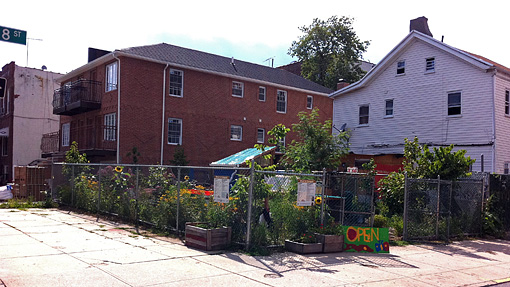
This now-thriving community composting garden in the Parkville neighborhood is the heart of Compost for Brooklyn; 50,000 pounds of organic waste were composted there in 2011. Just two years ago, it was a vacant lot.
Alumna nurtures Cornell connections through Brooklyn community composting project
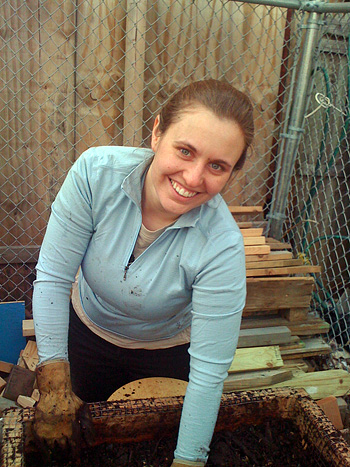
Louise Bruce '09 sifts compost (the final stage of composting) in the community composting garden. She co-founded Compost for Brooklyn in 2010.
Two years ago, Louise Bruce '09 turned a vacant lot in her Parkville, Brooklyn, neighborhood into a thriving community composting garden and the center of Compost for Brooklyn, an all-volunteer organization that now involves about 200 households. The garden composts vegetable scraps, coffee grounds and other organic waste, diverting thousands of gallons of waste that otherwise would end up in landfills.
About 30 regular volunteers keep Compost for Brooklyn running, and the group has partnered with local schools and businesses to help them get their own composting started.
Along the way, Bruce (whose father is Tommy Bruce, Cornell vice president for university communications) has made connections with other Cornell alumni doing similar work.
Bruce, now a graduate student in urban planning at NYU, says that the local composting network in New York City is huge -- many neighborhoods are actively developing and growing community composting, urban agriculture, ecological restoration and educational outreach programs. Those who come to Compost for Brooklyn's workshops are as interested in what others in the city are doing as they are in the topics of the workshops themselves, she says.
Looking for hands-on experience
As an undergraduate in Cornell's China and Asia-Pacific Studies (CAPS) program, Bruce became interested in environmental issues on her first trip to China, where she interviewed people who run nongovernmental organizations around environmental issues.
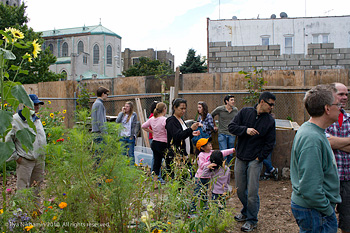
The first neighborhood gathering in Compost for Brooklyn's community composting garden. Louise Bruce notes that the compost bins are odor-free enough that neighbors are leaning casually on them and chatting. Photo by Ilya Nikhamin.
After graduating, Bruce took a yearlong job with a program of the New York City Parks Department that gave her training in their master composter program at the Lower East Side Ecology Center and opportunities for teaching composting in the public schools.
"It was almost magical, taking your trash and turning it into something that is extraordinarily useful right here in your neighborhood," she says.
When Bruce moved to Parkville near the Flatbush and Kensington neighborhoods, she soon discovered a vacant corner lot, measuring about 2,500 square feet.
"I was just obsessed with this space," she says. "I would walk by and tell people, 'I'm supposed to do something with this.'"
After convincing the owner of the lot to allow it to be turned into a community composting site in spring 2010, Bruce and several volunteers began to transform the lot; within a couple of months they also formed Compost for Brooklyn's board. The group is working to secure its status as a nonprofit.
Leveraging a local network
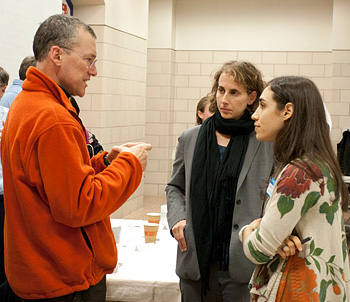
David Buckel, a 1987 graduate of Cornell Law School and a volunteer coordinator for Red Hook Community Farm, speaks with attendees following Compost for Brooklyn's "Trash Talk" forum in December 2011. Photo by Alan Gottlieb.
Bruce knows that her relatively small project not only diverts waste from the traditional trash stream, but also raises community awareness about composting, trash and resources; partners with local schools and businesses; and connects with other groups in in New York City doing similar work.
For example, when Bruce worked with local e-commerce company Etsy to find a place for them to compost their companywide lunches, she met David Buckel '87, a Cornell Law School graduate, who is a volunteer coordinator for Brooklyn's largest community composting project, Red Hook Community Farm, which composts 160 tons a year; together, they developed a regular system for Etsy.
In December, Compost for Brooklyn held the first of what is now an ongoing series of panel discussions called "Trash Talk" to showcase innovative waste management in New York City. Buckel spoke at the event, which also drew Nick McEvily '09, founder of Agrowculture, a New York City network that connects "urban farmers" -- people who pickle, bake, can or grow their own foods -- with potential customers within a 1-mile radius.
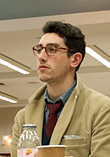
Nick McEvily '09. Photo by Alan Gottlieb.
Bruce has found that different, coexisting models of community composting are crucial to get local policymakers to embrace its importance to the future of waste management.
Buckel is "trying to compost as much as possible" to support a 2-acre urban farm, Bruce says. "But we're right in the middle of a residential neighborhood; our critical role is education, bringing the community together over this issue. People who may have previously never thought about composting are now starting to change their habits." Compost for Brooklyn hosts ongoing local street gardening efforts and educational programs like Bug Land Builders, a program for kids children about invertebrates.
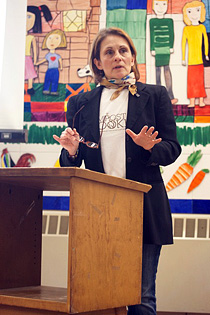
Miriam Garron, one of Compost for Brooklyn's core members and a chef at The Food Network, moderated the December "Trash Talk" panel discussion. Photo by Alan Gottlieb.
Buckel says that different models of community composting are needed so that "each neighborhood can find the best fit for its program of sustainable neighborhood practices."
Bruce is planning to look for ways to partner with McEvily and Agrowculture to focus more attention on local food production and outreach specifically in places considered food deserts. "When it comes to community projects, collaboration is more powerful than competition," McEvily says.
Bruce also continues to discover other Cornell connections. She began attending Cornell University Cooperative Extension-New York City presentations, such as an outreach event in 2010 at the Brooklyn Botanical Gardens, where she learned about street trees and CU Structural Soil from Cornell Professor Nina Bassuk, who more than a decade ago, helped develop the soil specifically for urban street trees that have to survive harsh conditions.
It seems that "every resource, every workshop, every talk has something to do with Cornell," Bruce says. "Cornell has this real presence, and there's the bringing of the science into it -- what is the real impact of the work we're doing, what is the data we can pull out of that, and how can we best do this work. Time and time again, everyone brings it back to resources from Cornell."